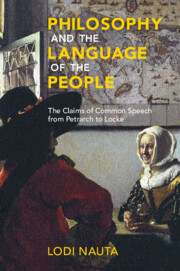Book contents
- Philosophy and the Language of the People
- Philosophy and the Language of the People
- Copyright page
- Contents
- Acknowledgments
- Introduction
- Chapter 1 Early Humanist Critics of Scholastic Language: Francesco Petrarch and Leonardo Bruni
- Chapter 2 From a Linguistic Point of View: Lorenzo Valla’s Critique of Aristotelian-Scholastic Philosophy
- Chapter 3 Giovanni Pontano on Language, Meaning, and Grammar
- Chapter 4 Juan Luis Vives on Language, Knowledge, and the Topics
- Chapter 5 Anti-Essentialism and the Rhetoricization of Knowledge: Mario Nizolio’s Humanist Attack on Universals
- Chapter 6 Skepticism and the Critique of Language in Francisco Sanches
- Chapter 7 Thomas Hobbes and the Rhetoric of Common Language
- Chapter 8 Between Private Signification and Common Use: Locke on Ideas, Words, and the Social Dimension of Language
- Conclusion
- Bibliography
- Index
Chapter 3 - Giovanni Pontano on Language, Meaning, and Grammar
Published online by Cambridge University Press: 13 July 2021
- Philosophy and the Language of the People
- Philosophy and the Language of the People
- Copyright page
- Contents
- Acknowledgments
- Introduction
- Chapter 1 Early Humanist Critics of Scholastic Language: Francesco Petrarch and Leonardo Bruni
- Chapter 2 From a Linguistic Point of View: Lorenzo Valla’s Critique of Aristotelian-Scholastic Philosophy
- Chapter 3 Giovanni Pontano on Language, Meaning, and Grammar
- Chapter 4 Juan Luis Vives on Language, Knowledge, and the Topics
- Chapter 5 Anti-Essentialism and the Rhetoricization of Knowledge: Mario Nizolio’s Humanist Attack on Universals
- Chapter 6 Skepticism and the Critique of Language in Francisco Sanches
- Chapter 7 Thomas Hobbes and the Rhetoric of Common Language
- Chapter 8 Between Private Signification and Common Use: Locke on Ideas, Words, and the Social Dimension of Language
- Conclusion
- Bibliography
- Index
Summary
This chapter discusses the work of the humanist, poet, and statesman Giovanni Pontano, focusing on his ideas on language, grammar, history, and philosophy. It shows that Pontano shared Valla’s conviction that a proper discussion of philosophical questions requires a deep familiarity with Latin (and Greek). Like his humanist predecessors, Pontano held medieval scholars and translators of Aristotle responsible for the demise of classical learning and knowledge. But as this chapter shows, Pontano was much more than a critic of medieval scholasticism. Inspired by the literary and philosophical heritage of classical antiquity, Pontano began to explore the social, emotive, and active functions of language. Focusing on language as a tool for communication, persuasion, and practical deliberation, he underscored the intimate connection between language and sociability. This becomes clear from an examination of his treatise on speech, De sermone, which shows the high level of semantic precision Pontano achieved in adapting Aristotle’s virtue ethics to his own contemporary society. The chapter suggests that the underlying assumption of Pontano’s semantic and philosophical discussions is the idea that in marking the boundaries of things, words enable us to distinguish aspects of reality, including the past, as a discussion of his views of history shows.
- Type
- Chapter
- Information
- Philosophy and the Language of the PeopleThe Claims of Common Speech from Petrarch to Locke, pp. 71 - 94Publisher: Cambridge University PressPrint publication year: 2021

